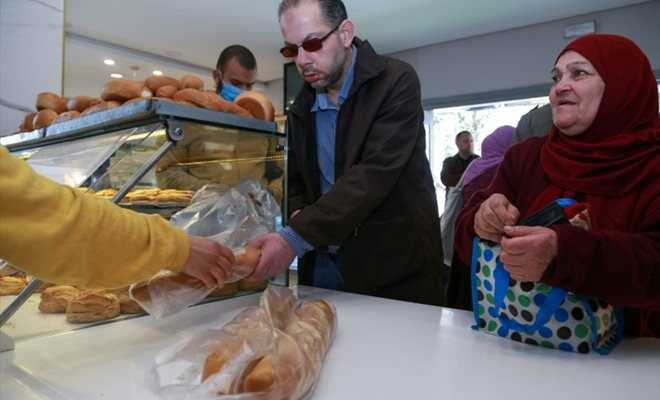A Tunisian works in a bakery in Tunis on March 11, 2022 (AFP/Anis MILI)
Flour and semolina rush: since the invasion of Ukraine by Russia, suppliers of wheat from the Maghreb, the prices of these products have been soaring in the region, accentuated by a frenzy of purchases before Ramadan in April.
In a supermarket in Ariana, north of Tunis, not a bag of flour or semolina on the shelves, and only three packets of sugar behind the label: “Please no more than 1 kg”, notes AFP.
According to store officials, “there is no shortage but a rush to buy semolina and flour”. Houda Hjeij, a 52-year-old housewife, accuses the state of having “failed to anticipate the war in Ukraine…I have had neither rice nor flour in my kitchen for two weeks”.
This frenzy, with a daily consumption of semolina which “jumped by 700%”, that of sugar which tripled, comes from the fact that in times of crisis, the Tunisian buys more to store, according to the representative of the owners of Hédi supermarkets Baccour.
Hédi Bouallegue, a 66-year-old retiree, goes around his neighborhood every day and buys a liter of oil or a kilo of semolina as soon as he finds it, kept at home, even if it means “paying double the price”.
– “No shortage”

An employee arranges bread in a bakery in Tunis, March 11, 2022 (AFP / Anis MILI)
Faced with robbed warehouses, Slim Talbi, owner of a private bakery, finds himself forced to buy cake flour at the supermarket at 18 dinars (5.5 euros) per 10 kg, three times more expensive than at his wholesalers. usual. “All this while we are not yet suffering the repercussions of the war,” he said, “worried” about Tunisia’s dependence on imports of Ukrainian soft wheat.
For the moment, Tunisia claims to have stocks for three months, and basic products (coffee, sugar, pasta, semolina) are largely subsidized, with a baguette price that has not been removed for 10 years at 6 euro cents.
This system, intended to avoid bread riots as in the 80s, also exists in Algeria which wants to abolish it but has not yet dismantled it.
Second African consumer of wheat behind Egypt (10 million tonnes per year), “it does not import soft wheat from Russia or Ukraine”, according to the cereals office OAIC. “There will be no shortage, grain carriers continue to transport large cargoes to the port of Algiers,” Mustapha, an official of the port captain’s office, told AFP.
Despite this, in Tizi Ouzou and Bejaïa, in Kabylie (east), semolina reserves have recently been robbed, causing a shortage. “The war in Ukraine and all the semolina depots taken by storm!”, Laments on Facebook, Mouh Benameur, a resident of Mechtras.
In fact, throughout the Maghreb, food prices were rising long before the Russian invasion of Ukraine.
This is explained “by the unexpected recovery in the world (after the recession caused by Covid-19, editor’s note) which resulted in a rise in the price of cereals and petroleum products on the international market”, recalls Fouzi Lekjaa , Minister Delegate for the Budget in Morocco.
– “Unscrupulous traders” –
“Agricultural products in general have become very expensive because of the rise in fuel prices, but also because of the drought”, the worst for 40 years in Morocco, explains to AFP Mourad, 37, a customer of a Rabat market.
Devoid of hydrocarbons, Morocco has been hit hard by soaring fuel prices. It has led to a strike by road hauliers in recent weeks and the government is “studying the possibility of subsidies to protect the purchasing power of citizens and keep prices at reasonable levels”, according to its spokesman, Mustapha Baitas.

Customers buy bread at a bakery in Tunis on March 11, 2022 (AFP/Anis MILI)
An oil and gas country but very dependent on its food imports (75% of its wheat comes from Russia and Ukraine), Libya has also seen prices soar, particularly for flour, milk, oil, preserves and sugar. The Ukrainian conflict has exacerbated these increases with now three rolls for one dinar (0.22 euro) instead of four, a product that is subsidized.
Some like Saleh Mosbah, a father, met on a wholesale market in Tripoli, denounces “unscrupulous traders who take advantage of all crises”.
“The government reassures people and says that there is enough wheat and flour, but I don’t think that’s true,” said Soumaya, a young woman in her thirties, who left with her arms encumbered by two large 5 kilo bags of flour.
© 2022 AFP
Did you like this article ? Share it with your friends with the buttons below.




